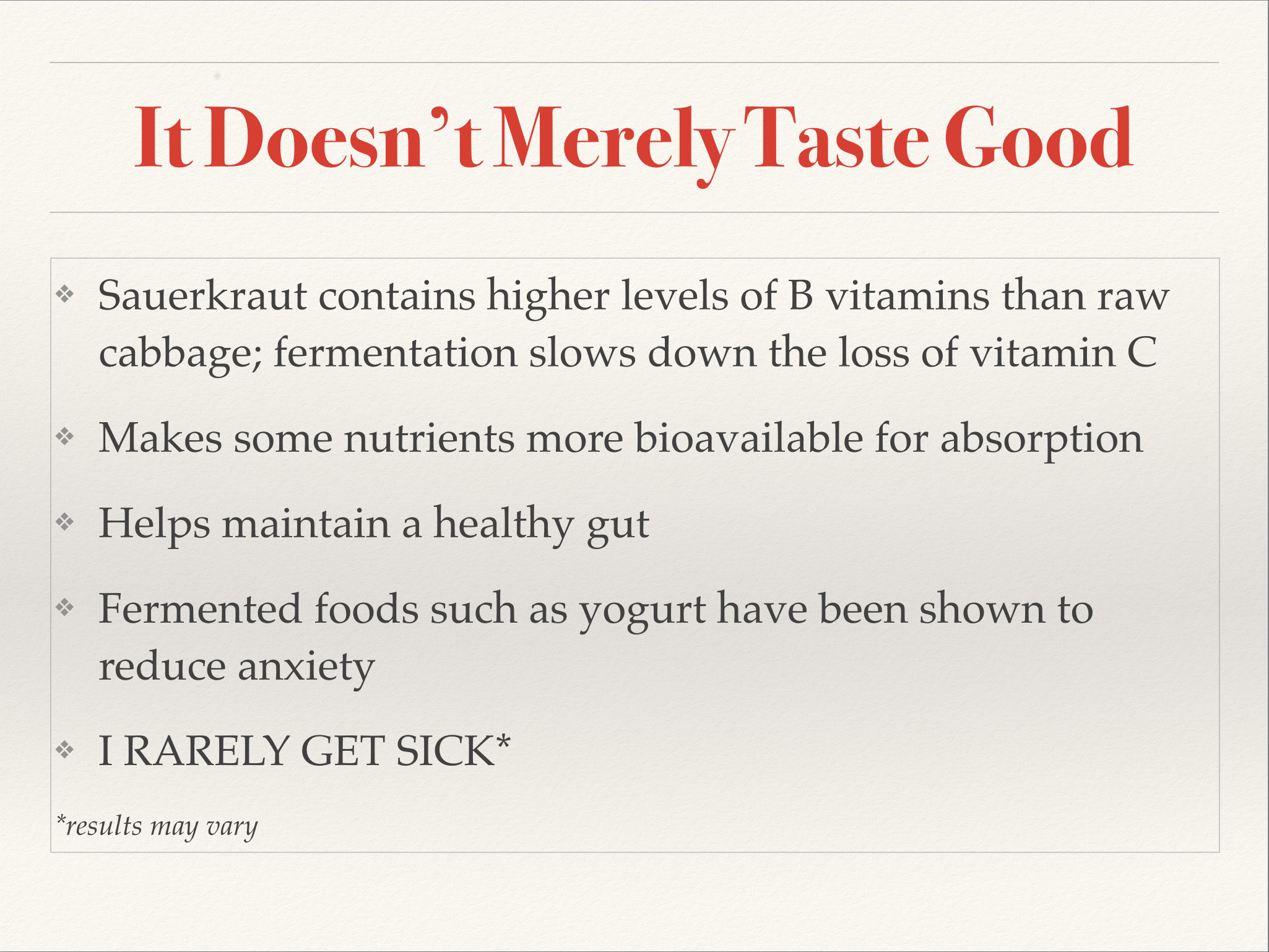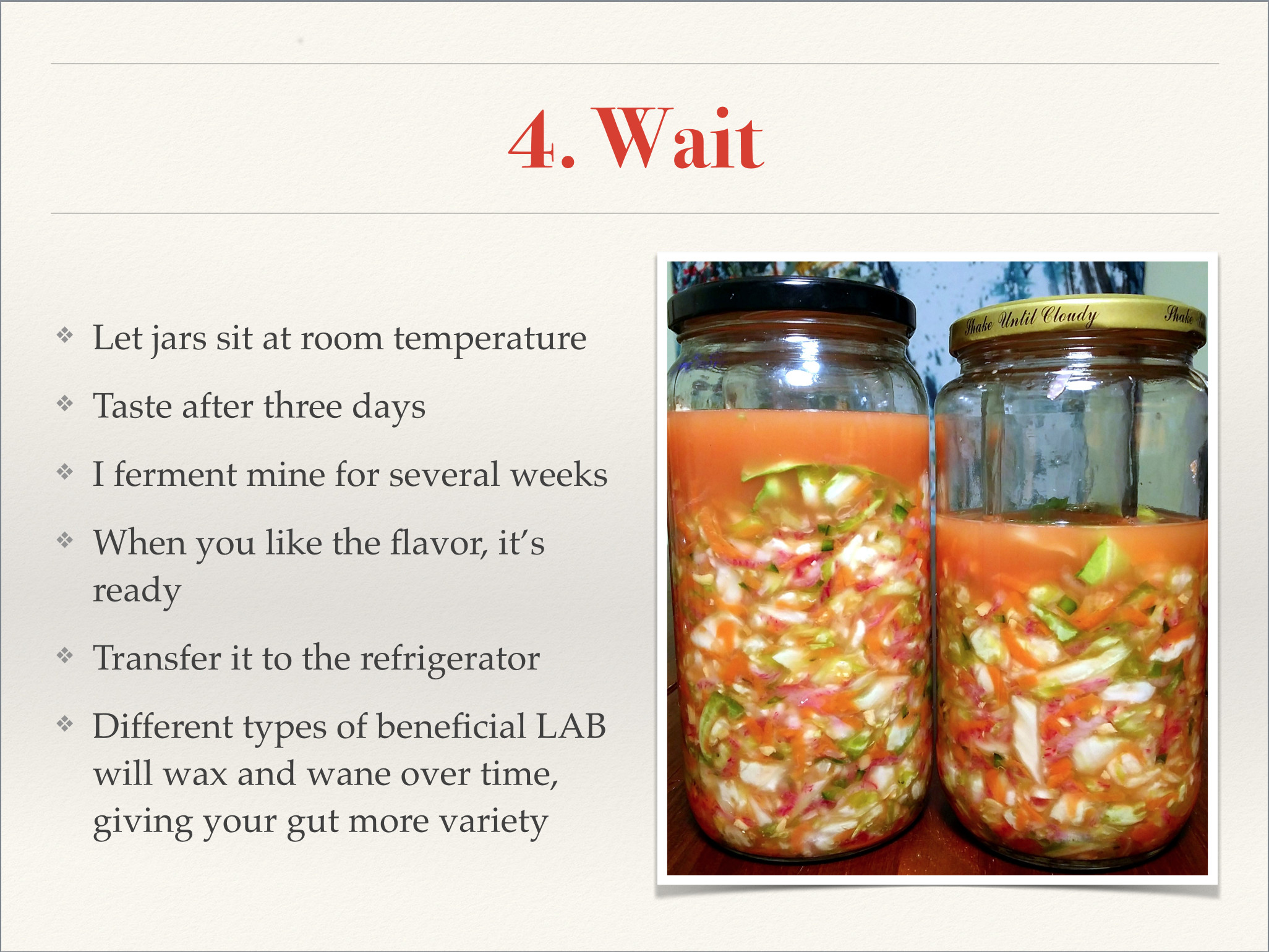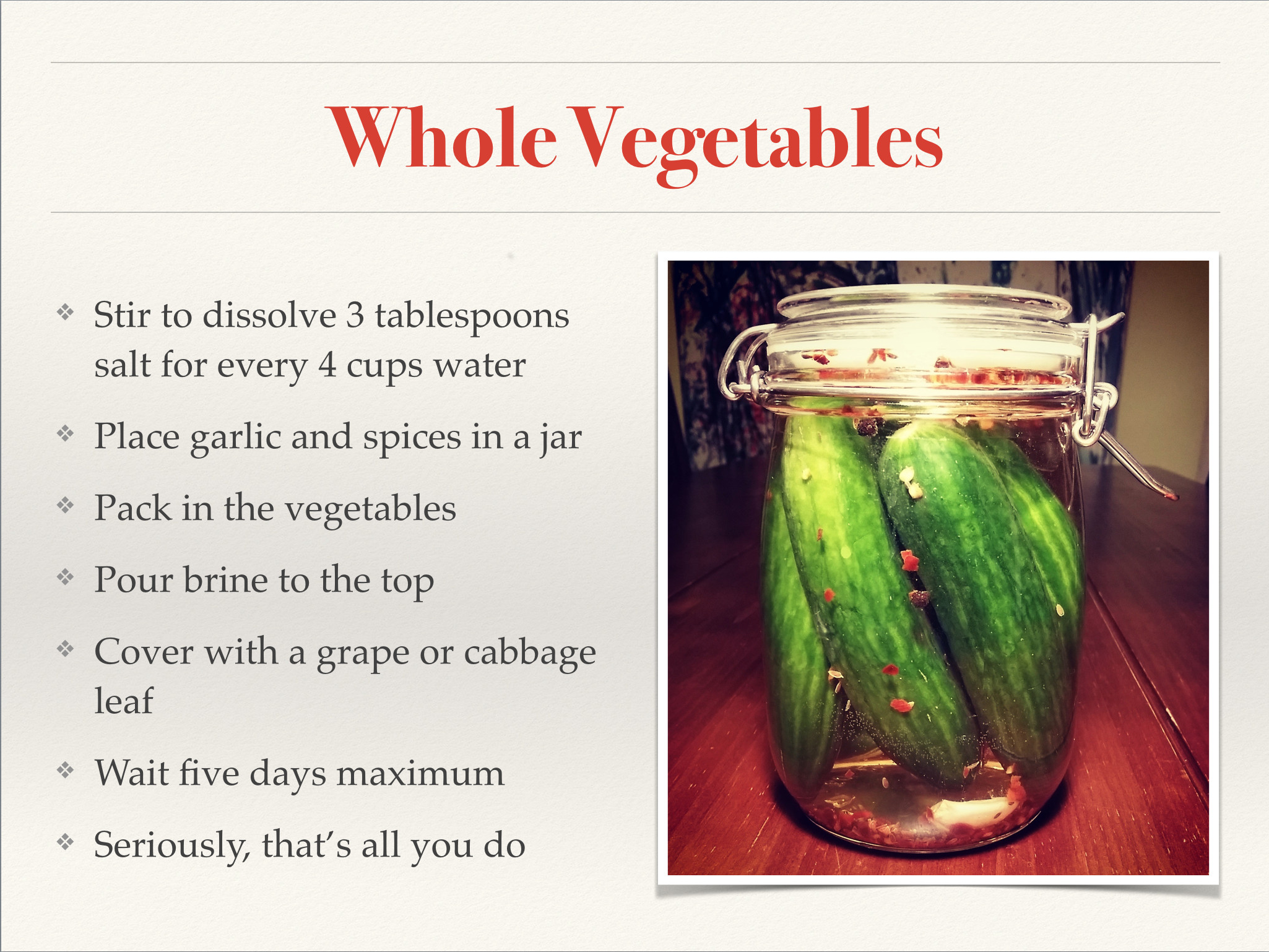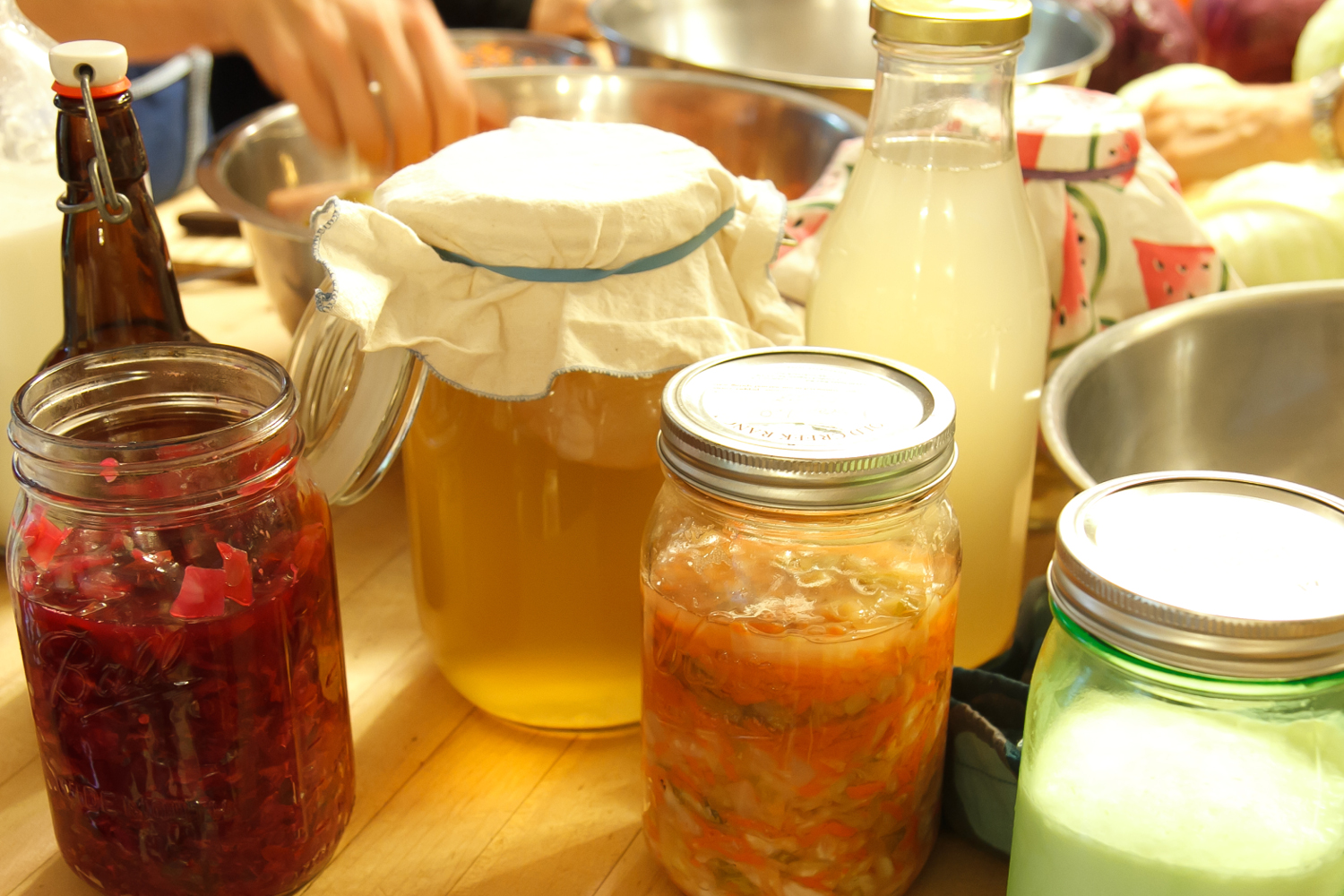Today I taught a fermentation workshop at CVSan in Castro Valley as part of the organization’s Commitment to Serve Week. The theme of the week is zero-waste. It was so much fun! (Thank you Jordan, Naomi and all the staff at CVSan.)
But what does fermentation have to do with food waste? Well, I’ve decided to post my slide presentation. I think it’s pretty self-explanatory.
In the United States, we waste 40 percent of the food we grow. I would hate to waste any of the delicious produce I bring home from the farmer’s market. But occasionally I don’t get to some of it right away and I have to do something with it before it starts to go off.




 Above left: fermented salsa (get the recipe)
Above left: fermented salsa (get the recipe)
Above right: This is my basic sauerkraut recipe with other vegetables and hard-boiled eggs packed in.
Above left: dill pickles
Above right: scrap vinegar (get the recipe)
 Above left: ginger beer on the left (get the recipe); mead on the right (get the recipe)
Above left: ginger beer on the left (get the recipe); mead on the right (get the recipe)
Above right: fermented Bloody Mary (get the recipe)
 Above left and right: kombucha. Get the basic recipe here. Get instructions for flavoring here.
Above left and right: kombucha. Get the basic recipe here. Get instructions for flavoring here.
 Above left: raisin-cardamom sourdough bread.
Above left: raisin-cardamom sourdough bread.
Above top right: sourdough crackers (get the recipe)
Above bottom right: sourdough bread (get the recipe)


 Click here for more detailed instructions on making sauerkraut.
Click here for more detailed instructions on making sauerkraut.




 Click here for more detailed instructions on brewing kombucha.
Click here for more detailed instructions on brewing kombucha. Click here for the mead recipe.
Click here for the mead recipe.
If you want to learn more about fermentation and how it helps maintain a healthy gut, I highly recommend the following books:
The Art of Fermentation: An In-Depth Exploration of Essential Concepts and Processes from Around the World, Sandor Katz
The Good Gut: Taking Control of Your Weight, Your Mood and Your Long-Term Health, Justin Sonnenburg and Erica Sonnenburg
Cooked: A Natural History of Transformation, Michael Pollan. Beginning February 19, Netflix will air the new Michael Pollan documentary series “Cooked.” I’ll be binge watching that!





If you wake up with a hangover and a opened bottle of stale red wine: find fruit (dried prunes are ideal), put in glass jar and cover with wine, leave. The longer the better the taste
That’s a great idea to prevent wine waste Paul. Thanks! How does it work for the hangover? 😉
This is a super helpful post. Thanks!
Thanks Nadine. I’m glad you found it useful 🙂
I recently discovered your blog and the zero waste was what first grabbed my attention (those cloth fridge bags!) but the fermentation is piquing my interest. My mom has had a kombucha for years and I just found it incomprehensible and I’d barely look at it much less drink it. Finally tried it last weekend and it was good! I’ve caught your enthusiasm and I’m ready to culture my own.
Thank you Alisa, you have given me hope that my younger daughter will one day drink my kombucha and eat my sauerkraut 😉 If I want to clear the kitchen, I just have to take down my jar of kombucha SCOBYs. Happy culturing! It’s so much FUN!
You always have such fun and informative posts Anne Marie! I’ve got 2 batches of Kombucha brewing now and a skobe hotel that is overflowing (thanks to your original!) I’m going to try a second fermentation with blood orange juice and lime. Can’t wait to see how it turns out 🙂
Thank you Karen. Blood oranges and lime!!! That sounds fantastic! I have to try that. Thanks for the idea. Have a great weekend 🙂
I love this and have pinned it so I can get back to it easily. A great resource for all things ferment. Our “kidchi” is one of our children’s favorite foods because the carrots and daikon in there are so crunchy. Can’t wait to try some of your recipes. — Liesl at Pioneering the Simple Life
Thanks so much Liesl. I’m glad you found it useful. I love that name–kidchi! That’s great your kids like it. They must be very healthy 🙂
Excellent post. People need to get over their queeziness pertaining to food and fermentation in paticular. We are flesh and blood and a part of nature. We even OMG…. Poop once in a while!
Hi Mike. Yup, we kill bacteria almost pathologically, even the good guys, and it has had a devastating effect on our guts. Luckily that is slowly starting to change. Speaking of poop, have you read about fecal transplants and the high success rates they have had treating certain diseases? The microbiome is such an exciting field of research and fermentation plays a huge role in maintaining a healthy gut.
I actually can see that working tho I would not ever admit to that or a colon washing either 🙂 People say eating fermented foods does not help spread the probiotic bugs to the colon. One fella said the we would have to eat tons of yogurt to make a difference. That eating one probiotic pill would do more in other words. That is utter nonsense as studys show that ordinary amounts of a yogurt for instance containing a marker bacteria does make itself know in flora withing a few days.
What I like to think especially about home fermentation is that it is a way to always introduce a new or slightly different strain to our system to keep the ones we have from becoming to “inbred”. That is just my opinion and probably amounts to a hill of dirt.
Well that fella didn’t know what he was talking about. Probiotic pills contain only a few strains and those are the strains that we know are safe–the ones in the fermented foods we have eaten for millennia. The probiotics industry doesn’t want to pay for expensive R&D for other strains so they stick to these. The book The Good Gut discusses the research on the microbiota. Two Stanford researchers wrote it and they are pioneers of microbiome research. In other words, this isn’t quackery. You can read my post about their book here: http://zerowastechef.com/2015/06/21/a-great-read-the-good-gut/
I agree with you about introducing new strains. Sauerkraut over time changes and has different strains of lactic acid bacteria in it. So you’re supposed to eat it over time for the microbial variety. I would say you’re right on the money. We need diversity in our gut. It’s all in the book. I highly recommend it. I really enjoyed it.
Great post! For me, fermentation is a really helpful in preventing food waste. At least for my family, because we are using it for years to preserve a big part of the vegetables we produce and we find it also a great way to to diversify our meals . My opinion is that controlling food waste is a personal responsibility for each of us, and everything should begin within the family first. Thank you for this post!
Awesome post! Fermentation is such a useful, and delicious method of preserving food! Thank you for sharing!
[…] gut, your pocketbook, your tastebuds and our environment. Check out this fantastic post from the Zero Waste Chef for additional information on fermentation and several recipe […]